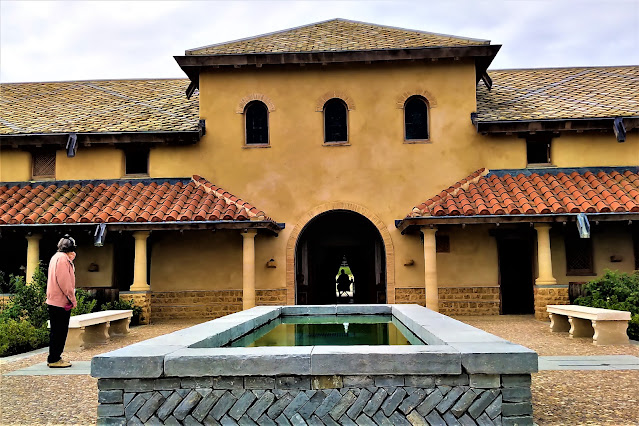SURVIVING THE DOWNTURN-3
Background
This post follows on from earlier ones of April 25th and April 16th which were titled 'Surviving the Downturn' with emphasis on prognosis for the Scottish tourism industry.
Today, I am focusing on two aspects of the industry, namely climate change/emissions and quality of the visitor experience
Cruise Ships
Over the years I have arranged-and personally delivered-various day trips from cruise ships, mainly from Greenock but also Edinburgh.In the course of my tours I have had numerous encounters with cruise ship coach groups at Loch Ness (ex-Invergordon) and on Orkney.
Until very recently, I was oblivious to the fact that a single cruise ship can emit as much pollution as 700 trucks and as much particulate matter as a million cars. This pollution is exacerbated when visiting ships disgorge hundreds, sometimes thousands of their guests into fleets of tour buses for day trips at various ports as the vessels circumnavigate the country.
Ranked by 'wow factor' and quality of experience I doubt if the tour bus trips rank much higher than medium quality. Over and above that consideration, what is the economic benefit to the local communities where the ships berth? Most of the guests would purchase a meal and maybe a souvenir at the tourist traps where they are deposited, say USD30.00 p.p., not at the berthing ports.
I would imagine the financial benefit from the bus trip would accrue to (a) the local bus companies (b) tour guides, and (c) cruise ship operator via commissions for the trips.Is this a satisfactory trade-off for the emissions and damage to the environment (ship and buses combined)?
Quality of Experience
There seems to be an emerging consensus to effect that a return to 2018/2019 levels of visitor numbers may not occur for around three years during which period a considerable element (maybe 20-30 pct. of total) of tourist industry businesses will have disappeared.
During this interregnum there is a case for industry leaders to consult widely with participants to determine where Scotland is to be positioned in the future, maybe a 'smarter' more upscale offering, away from the 'tartan and shortbread' stereotype? In this connection, could consideration be given to devising training and career paths to encourage local people to participate in the hospitality industry?
Summary
Clearly, the Scottish tourism industry is facing a downturn of a ferocity unprecedented since World War 2. However, the opportunity should be taken to re-group and re-position with emphasis on a sustainable range of products designed for the future with climatic considerations to the fore.
Nigel Cole
This post follows on from earlier ones of April 25th and April 16th which were titled 'Surviving the Downturn' with emphasis on prognosis for the Scottish tourism industry.
Today, I am focusing on two aspects of the industry, namely climate change/emissions and quality of the visitor experience
Cruise Ships
Over the years I have arranged-and personally delivered-various day trips from cruise ships, mainly from Greenock but also Edinburgh.In the course of my tours I have had numerous encounters with cruise ship coach groups at Loch Ness (ex-Invergordon) and on Orkney.
Until very recently, I was oblivious to the fact that a single cruise ship can emit as much pollution as 700 trucks and as much particulate matter as a million cars. This pollution is exacerbated when visiting ships disgorge hundreds, sometimes thousands of their guests into fleets of tour buses for day trips at various ports as the vessels circumnavigate the country.
Ranked by 'wow factor' and quality of experience I doubt if the tour bus trips rank much higher than medium quality. Over and above that consideration, what is the economic benefit to the local communities where the ships berth? Most of the guests would purchase a meal and maybe a souvenir at the tourist traps where they are deposited, say USD30.00 p.p., not at the berthing ports.
I would imagine the financial benefit from the bus trip would accrue to (a) the local bus companies (b) tour guides, and (c) cruise ship operator via commissions for the trips.Is this a satisfactory trade-off for the emissions and damage to the environment (ship and buses combined)?
Quality of Experience
There seems to be an emerging consensus to effect that a return to 2018/2019 levels of visitor numbers may not occur for around three years during which period a considerable element (maybe 20-30 pct. of total) of tourist industry businesses will have disappeared.
During this interregnum there is a case for industry leaders to consult widely with participants to determine where Scotland is to be positioned in the future, maybe a 'smarter' more upscale offering, away from the 'tartan and shortbread' stereotype? In this connection, could consideration be given to devising training and career paths to encourage local people to participate in the hospitality industry?
Summary
Clearly, the Scottish tourism industry is facing a downturn of a ferocity unprecedented since World War 2. However, the opportunity should be taken to re-group and re-position with emphasis on a sustainable range of products designed for the future with climatic considerations to the fore.
Nigel Cole

Comments
Post a Comment